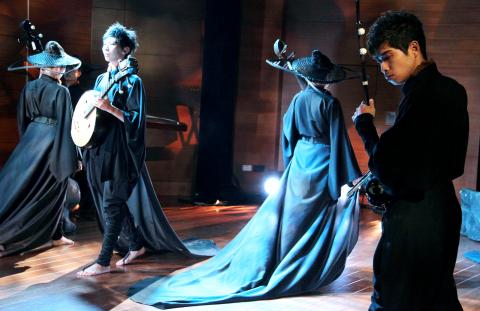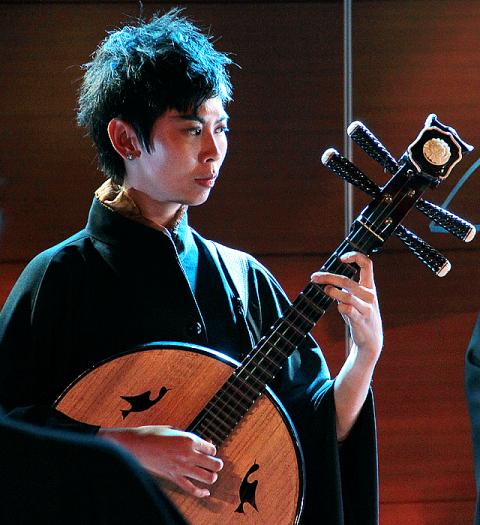Established in 1991 as a traditional Chinese ensemble, Chai Found Music Workshop (采風樂坊) has battled valiantly to broaden the appeal of traditional Chinese chamber music through the incorporation of modern musical styles and dramatic elements. This weekend, it presents Wuji (無極), the most recent composition by troupe founder and artistic director Huang Cheng-ming (黃正銘). This work, with its atmospheric stage setting and stylistic borrowings from the epics of martial arts and chivalry, aims to captivate a younger audience.
With Wuji, Huang has moved away from the overtly dramatic presentation of works such as 2005’s Ambush! — An Instrumental Musical (十面埋伏) and 2007’s The Journey of the Monkey King (西遊記), both of which were based on well-known stories. With Wuji, he has shifted toward something more abstract. This new work is a representation of the four seasons as felt by a nameless itinerant warrior. Why he is where he is and what led him there are all left up to the imagination of audience members, who can find their own interpretation of the tale as the changing moods of the seasons wash over them.
In this wider imaginative space, the musical instruments have greater scope for individual expression.

Photo courtesy of Chai Found Music Workshop
“For example, the deep, resonant sound of the ruan (阮) underscores a darker side to the protagonist’s character, which is juxtaposed against the strong, vibrant notes of the erhu (二胡) [the protagonist’s main instrument],” Huang said. “The two sides, darkness and light, struggle against each other.”
This abstract musical struggle is set against a visual backdrop inspired by martial arts epics and fantasy tales, with the costumed musicians also serving as performers and dancers. Huang achieved remarkable results in The Journey of the Monkey King, cajoling his young musicians to not only play their instruments, but also serve as characters in a story. In this more abstract work, the performers have an even more difficult task in being physically expressive without the aid of a narrative structure.
The use of backing music, notably some percussion, gives the production a driving energy, but from sections reviewed during a pre-debut lecture/performance last month, its effectiveness is questionable, for while it makes the music accessible, it also diminishes its rigor and character. It is clear that Huang is striving for a contemporary feel to this piece, and these efforts are laudable, but with Wuji one cannot get away from the feeling that the group is trying a little too hard to be all things to all people.

Photo courtesy of Chai Found Music Workshop
The skill and versatility of the Chai Found Music Workshop has been proved repeatedly in collaborations with experimental musical groups including the French contemporary Ensemble 2e2m and the Dutch Nieuw Ensemble. The troupe also continues to uphold the traditional skills of the Chinese ensemble orchestra and is engaged in the training of a new generation of performers. The venture into musical theater, which began in 2005, has already proved exciting, and Wuji, the third production of this type, is another chance for Chai’s young performers to show off their virtuosity.
Wuji premiers at the National Theater in Taipei City today at 7:30pm, with performances tomorrow at 7:30pm and Sunday at 2:30pm. Tickets are NT$300 to NT$2,000. The production will also show in Hsinchu on Wednesday, with further performances in Jhongli and Taichung next month.

In the March 9 edition of the Taipei Times a piece by Ninon Godefroy ran with the headine “The quiet, gentle rhythm of Taiwan.” It started with the line “Taiwan is a small, humble place. There is no Eiffel Tower, no pyramids — no singular attraction that draws the world’s attention.” I laughed out loud at that. This was out of no disrespect for the author or the piece, which made some interesting analogies and good points about how both Din Tai Fung’s and Taiwan Semiconductor Manufacturing Co’s (TSMC, 台積電) meticulous attention to detail and quality are not quite up to

April 21 to April 27 Hsieh Er’s (謝娥) political fortunes were rising fast after she got out of jail and joined the Chinese Nationalist Party (KMT) in December 1945. Not only did she hold key positions in various committees, she was elected the only woman on the Taipei City Council and headed to Nanjing in 1946 as the sole Taiwanese female representative to the National Constituent Assembly. With the support of first lady Soong May-ling (宋美齡), she started the Taipei Women’s Association and Taiwan Provincial Women’s Association, where she

Chinese Nationalist Party (KMT) Chairman Eric Chu (朱立倫) hatched a bold plan to charge forward and seize the initiative when he held a protest in front of the Taipei City Prosecutors’ Office. Though risky, because illegal, its success would help tackle at least six problems facing both himself and the KMT. What he did not see coming was Taipei Mayor Chiang Wan-an (將萬安) tripping him up out of the gate. In spite of Chu being the most consequential and successful KMT chairman since the early 2010s — arguably saving the party from financial ruin and restoring its electoral viability —

It is one of the more remarkable facts of Taiwan history that it was never occupied or claimed by any of the numerous kingdoms of southern China — Han or otherwise — that lay just across the water from it. None of their brilliant ministers ever discovered that Taiwan was a “core interest” of the state whose annexation was “inevitable.” As Paul Kua notes in an excellent monograph laying out how the Portuguese gave Taiwan the name “Formosa,” the first Europeans to express an interest in occupying Taiwan were the Spanish. Tonio Andrade in his seminal work, How Taiwan Became Chinese,